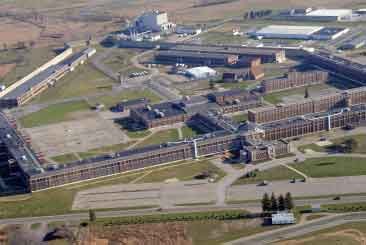|
|
| The Optimum Prison Industry |
| By John Dewar Gleissner, Esq |
| Published: 07/11/2011 |
 Legal restrictions prevent American prison industries from running at optimum levels. If those legal barriers were repealed, here's what the optimum prison industry might look like:
Legal restrictions prevent American prison industries from running at optimum levels. If those legal barriers were repealed, here's what the optimum prison industry might look like:
The work community or workhouse containing the industry would only make widgets now manufactured exclusively overseas, overcoming the current legal impediments to prison industries. The employer would rent space from the state or federal prison or perhaps build a separate building on or off the prison grounds to prepare for making widgets. Widget-making machinery is brought in, and it may not be the most up-to-date machinery. The proprietor of this business then hires from among the state's or federal government's inmates, choosing those it prefers without any legal concerns or restrictions, just as American businesses did 150 years ago. The wages, hours and conditions of employment are negotiated between the employer and the prospective employees and committed to writing. Employers are free to pay $1.25 per hour if prisoners will agree to work for that. There are no wage and hour legal restrictions, because prisoners don't deserve them. The prison industry is completely free to negotiate with the prison authorities for food, clothing, medical care, security, guards, rent and other things. The private employer must reduce the state's correctional costs or else it cannot co-locate, hire prisoners or remain a prison industry. The company buys supplies and services from off-site free businesses and unionized labor, boosting the American economy. This is not convict leasing, because prisoners can choose to remain in the general prison population or return there if they don't like making widgets in the new work community, subject to their contract of employment. By the same token, employers can send prisoners back to the general prison population for any reason or no reason, subject to the contract the parties have signed. Troublemakers get sent back early in the process. By exercising this selectivity, the employer keeps peace in the work community; prisoners prize these jobs. If the prisoner tries to escape, the prisoner's earned wages are forfeited. Fines might be imposed for other misbehavior. The longer the inmate works, the less likely the prisoner attempts escape or misbehavior. In fact, prisoners in the general prison population behave better to improve their chances of obtaining one of the better private jobs. Payment of wages is not to the prisoner directly, but instead into a special trust account managed by the employer, with some oversight by prison authorities. Deductions can be made for child support, crime victim restitution or for room and board at the prison. At the end of the prisoner's sentence, the prisoner has learned to work hard and receives the balance in his or her trust account, a nest egg or "freedom dues" as indentured servants were paid in the colonial era. For those serving life without parole or very long sentences, their earnings permit them to enjoy some luxury items. The employer makes sure the work community is a better environment than the general prison population. The work community is safe. A moral atmosphere is encouraged and enforced. Family and friends are welcomed and attracted. Inmates must abandon gang and criminal activities and help stop fights. When religious organizations run these communities, attendance at religious services can be mandated or heavily encouraged. Prisoners can have a weekly party, dance or get-together and music is encouraged. The food, rooms, yards and exercise facilities are superior to what they had in the regular prison. OSHA is enforced for the sake of industrial safety. Except for repairs or planned outages, prisoners run the widget-making machinery 24 hours per day, seven days per week and 52 weeks every year. Each prisoner is working up to 60 hours per week, which is easier to do without commutes, family activities and the other distractions of life among the free. Prisoners don't work 10-hour shifts; they have a nap or rest period between 5-hour shifts. American manufacturers give foreign manufacturers more competition. Prisoners learn job skills, teamwork, discipline, conflict resolution, manners and respect for others on the job. Habits of hard labor transfer easily to the free world. After years of 60-hour weeks, prisoners know how to work hard. It even begins to look good on the felon's resume, because a 40-hour week is then easy to perform. Rehabilitation prospects soar. Correctional expenses drop. Profits increase, as do tax revenues. Prison overcrowding lessens. Kids see their incarcerated parents more often. Governors more readily issue pardons to prisoners who have worked 60 hours per week for 5, 10 or 20 years and paid restitution to their victims. In fact, everybody wins... except foreign manufacturers. Editor's note: Corrections.com author John Dewar Gleissner, Esq. graduated from Auburn University (B.A. with Honor, 1973) and Vanderbilt University School of Law (1977), where he won the Editor's Award and participated in the Men's Penitentiary Project. In addition to practicing law in Alabama for the last 33 years, Mr. Gleissner is the author of the new book "Prison and Slavery - A Surprising Comparison" Reprinted with permission from ezinearticles.com. Other articles by Gleissner: |
MARKETPLACE search vendors | advanced search

IN CASE YOU MISSED IT
|


Comments:
No comments have been posted for this article.
Login to let us know what you think